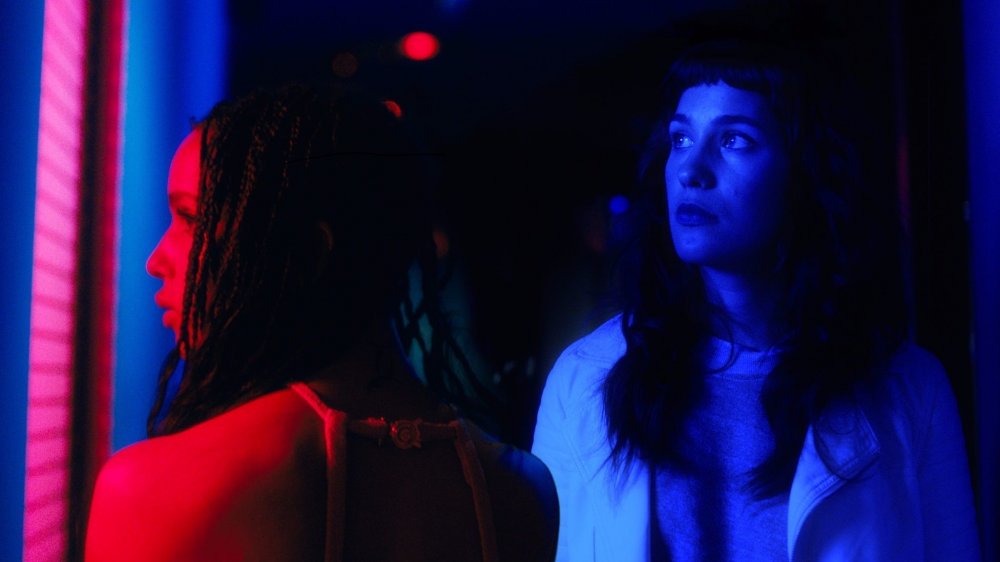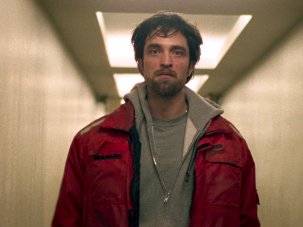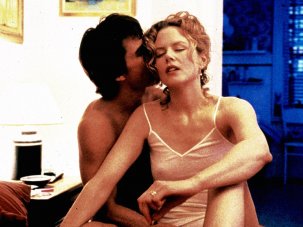The 2017 BFI London Film Festival ran 4-15 October.
If the crime genre is seemingly resistant to change it is at least wide-ranging enough to welcome all kinds of oddball film orphans into its ranks. There’s the heist caper, the outlaw road movie, the grim serial-killer drama, the hitman film and the like. While the genre slowly lumbers forward, this year’s BFI London Film Festival was brimming with a selection of criminal activity, with movies as self-referential as they were eclectic. John Woo’s Manhunt proved a return to the elegant actioners of his heyday. There was Lynne Ramsay’s dark-hued You Were Never Really Here and the Safdie brothers’ rampant Good Time, along with Fabio Grassadonia and Antonio Piazza’s Sicilian Ghost Story, a quasi-supernatural and deeply unconventional Mafia tale.
- Good Time review: Robert Pattinson careens the Safdies’ mean streets
- You Were Never Really Here review: Joaquin Phoenix storms Lynne Ramsay’s kidnap thriller
Bruno Forzani and Hélène Cattet, specialists in throwback genre rejigs (Amer, Strange Colour of Your Body’s Tears), made their first foray into crime with Let the Corpses Tan. Adapted from a French pulp novel of the early 1970s, the film is a gorgeously abstract mix of shoot-em-up Eurocrime and sun-baked Mediterranean landscapes, which recall the spaghetti western. With its Leone-style extreme close-ups and Godardian juxtapositions, this is a lurid bloodbath especially designed for the cinephile. But Forzani and Cattet offer more than empty homage – their artful and thrilling genre deconstructions make apparent the influences that other crime films work to bury.
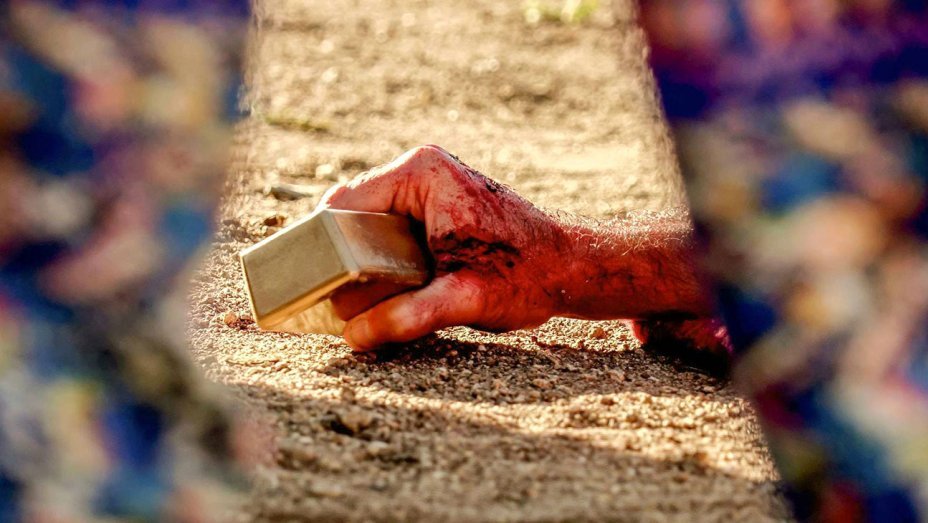
Bruno Forzani and Hélène Cattet’s Let the Corpses Tan
In more commercial and restrained areas, David Fincher’s opening two episodes of new Netflix series Mindhunter also premiered at the fest. The pristine period setting and cat-and-mouse cop procedural are everything that we’ve come to expect from Fincher. Young FBI egghead Holden Ford (Jonathan Groff) is fascinated by the psychology of violent criminals at a time when behavioural science is still regarded with suspicion. His efforts to build a case study of serial-killer behaviour become the focus of Fincher’s series, and it builds at a fantastically cagey pace.
Featuring a great turn from Cameron Britton as prim psychopath Ed Kemper (aka ‘The Co-Ed Killer’), the show both examines and exploits the public fascination with gruesome murder. And for stylistic flourish, look no further than Fincher’s virtuoso montage of quotidian business travel in Episode 2. Airport lounges and cheap motels were never used so effectively.

David Fincher’s Mindhunter
Mindhunter is set in 1977, only a few years after the horror of the Son of Sam killings, sharing a yen for the 1970s with many of the new crime films that appeared at LFF. In lean whodunnit Small Town Crime, John Hawkes’s performance recalls Columbo, everyone’s favourite shambolic TV detective, who first appeared in 1971. If something in the vein of Altman’s The Long Goodbye appeals, Aaron Katz’s Gemini would fit the bill – stylish and sleek, with Los Angeles as a supporting character. If a 70s feel brings to mind psychotic violence with a helping of existentialism, as in Sam Peckinpah’s Bring Me the Head of Alfredo Garcia, you might try Brawl in Cell Block 99, which offers plenty of variations on the ‘unreconstructed man looking for apocalyptic revenge’ theme.
In Small Town Crime, Hawkes plays a failed policeman and local dipsomaniac, stumbling into the role of an ad-hoc PI as he investigates the brutal murder of several prostitutes. The film is a little knowingly old-hat, but Hawkes carries it off, driving around in his old Chevy Nova and inhaling beer by the gallon. Small Town Crime doesn’t linger in the system for long – but it’s a highly entertaining watch.
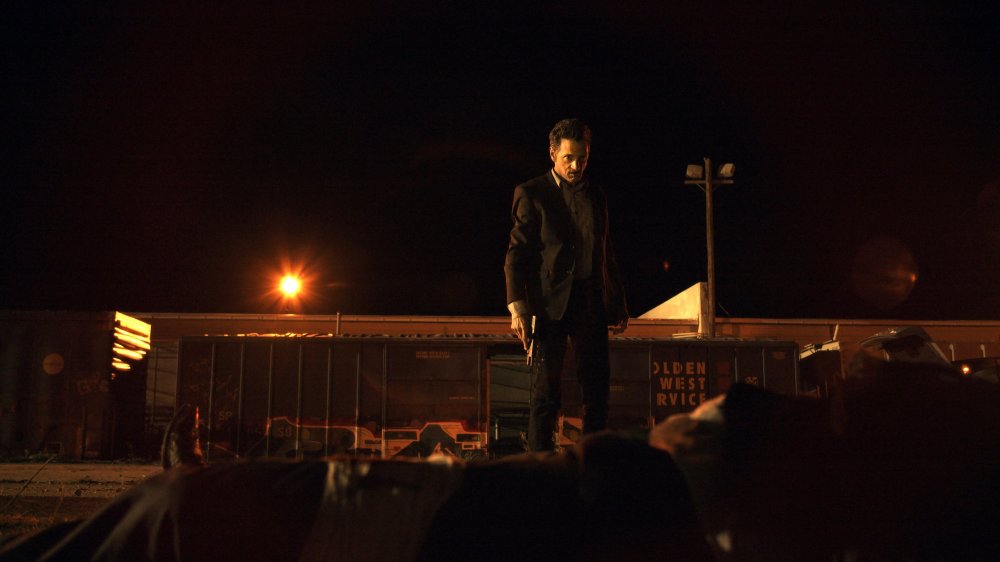
John Hawkes in Small Town Crime
Gemini, another American genre entry, borrows from a similar gumshoe vernacular in a far more contemporary way, transforming the ‘wrong man’ of 1940s Hollywood into the ‘wrong woman’ of present-day Los Angeles. Lola Kirke stars as a personal assistant who is drawn into a set of mysterious circumstances around her boss – a self-involved but vulnerable film star played by Zoë Kravitz. Katz’s cool-toned city setting suggests the architectural awareness of a film like Los Angeles Plays Itself, Point Blank and a sprinkling of early Curtis Hanson, with its mishmash of high modernism, art deco and urban sprawl. But Katz flips the switch on the symbiotic, ambiguous relationship between the leads – looking at the power dynamic between two women and allowing them, refreshingly, to lead his neo-noir.
Do prison films fall into the category of the crime film? Certainly the former is the logical conclusion of the latter. In spite of the prison film’s evident interest in criminals, their motivations and how they cope with the repercussions of their actions, it’s a sub-genre that often stands alone.

Panya Yimumphai in Jean-Stephane Sauvaire’s A Prayer Before Dawn
I’d make an exception for outstanding prison drama A Prayer Before Dawn, relating the exploits of real-life hoodlum, drug dealer and prison Muay Thai boxing champ Billy Moore. Unafraid of the appalling filth and violence of the film’s setting, director Jean-Stephane Sauvaire uses tight framing and a eye for the festering detail of the Thai prison that Yorkshire lad Billy ends up in. While it’s not for the faint-hearted – it features prison rape, sewed-on ears and heroin hidden in all the expected body cavities – it’s a deeply intelligent film about the pitfalls of violent masculinity.
It’s also surprisingly sensual at times, allowing its lead (an animalistic Joe Cole) some tender moments with a transgender prisoner. A Prayer Before Dawn’s more conspicuous instances of male touching – freehand tattooing, oiling up before and after fights – call to mind artist Barbara Kruger’s statement: “You construct intricate rituals that allow you to touch the skin of other men.”
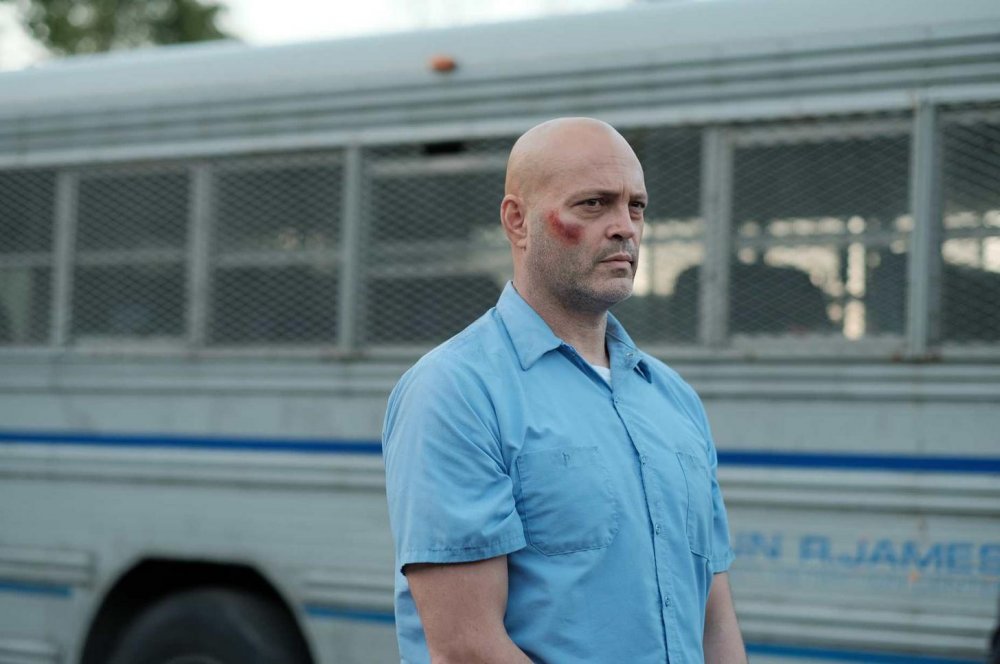
Vince Vaughn in S. Craig Zahler’s Brawl in Cell Block 99
A far less nuanced prison drama comes in the form of S. Craig Zahler’s mean-spirited Brawl in Cell Block 99 – a pure genre exercise that touts little external meaning. Its bone-crunching, skull-bashing violence is likely to provoke a love/hate reaction, as was the case with Zahler’s previous film, horror-western Bone Tomahawk. In Brawl, a shaven-headed Vince Vaughn uses his physical bulk to crack, smash and bleed his fellow prisoners with the abandon of a man desperate to save his kidnapped family. It’s incredibly good fun – and sure to make a few hand-wringers uncomfortable.
If many crime films at this year’s LFF are referential or indebted to the genre’s past, it may be an Egyptian film that looks to the political dimensions of the crime film in modern times. The Nile Hilton Incident is a Cairo-set noir that makes whatever familiar narrative points it has look boldly contemporary. Writer-director Tarik Saleh takes us back to 2011, on the cusp of the revolution, and introduces us to a ruminative, sullen policeman (Fares Fares) hunting the killer of a young female nightclub singer. Between the implications of wider corruption under President Mubarak and the disillusioning self-interest of so many of its complicit figures, this is a hyper-specific portrait of a tumultuous moment in the recent past.
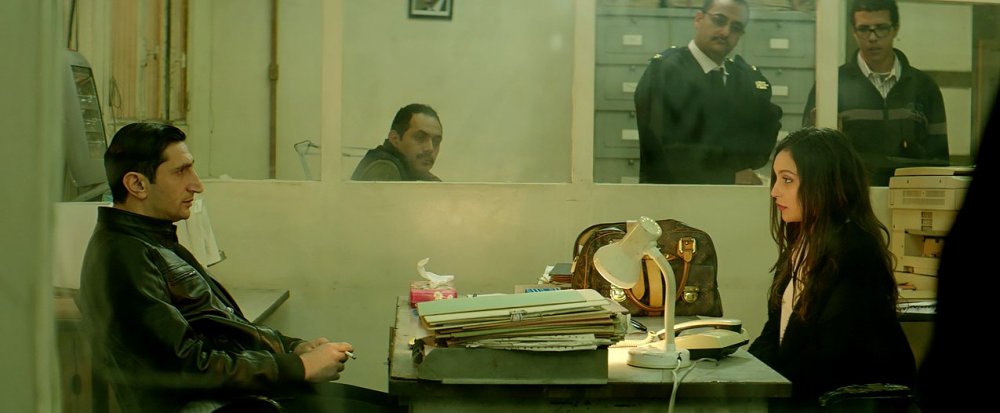
Fares Fares (left) in The Nile Hilton Incident (2017)
The crime film’s assortment of drug pushers, bank robbers, mob bosses and laconic detectives may not change, but that revolving door of familiar tropes remain open to revision: see Gemini’s female leads, or A Prayer Before Dawn’s interrogations of machismo. For viewers who appreciate for the genre’s rich legacy, the possibilities for its future will be all the more compelling.
In the November 2017 issue of Sight & Sound
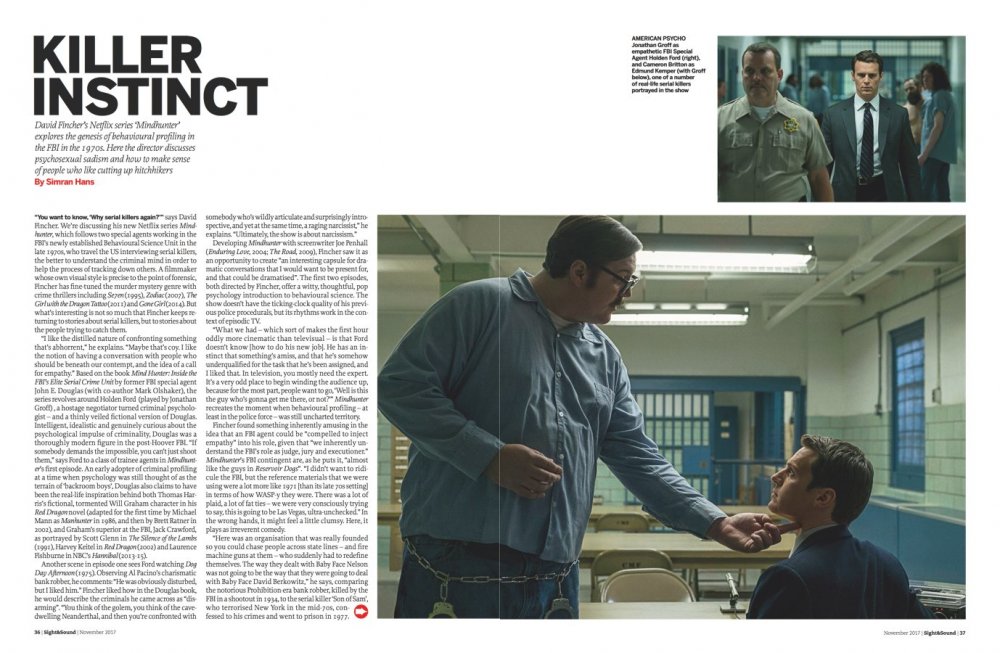
Killer instinct
David Fincher’s Netflix series Mindhunter explores the genesis of behavioural profiling in the FBI in the 1970s. The director discusses psychosexual sadism and how to make sense of people who like cutting up hitchhikers with Simran Hans.
-
BFI London Film Festival 2017 – all our coverage

Follow all our coverage of the 61st London Film Festival, including reviews of the top films, interviews with their makers and blog posts from our...
-
The Digital Edition and Archive quick link
Log in here to your digital edition and archive subscription, take a look at the packages on offer and buy a subscription.




